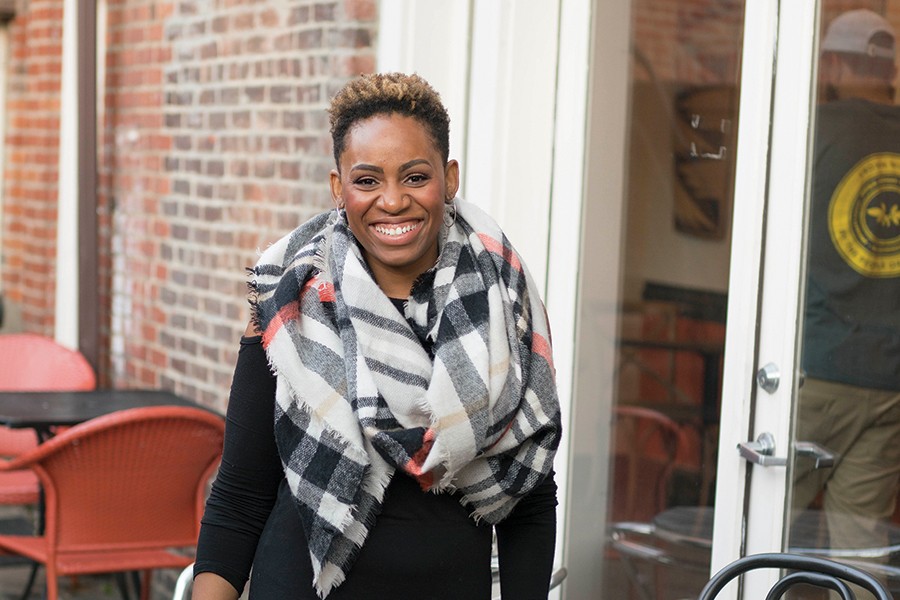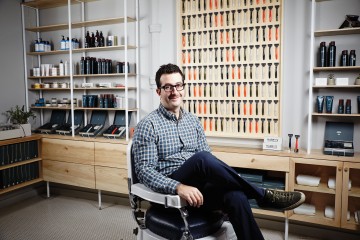Kristian Henderson, SPH '16 (DrPH), had grown frustrated by how hard it was to find the products she wanted. The 30-year-old Washington, D.C., resident was tired of browsing the "ethnic" aisle of big box stores only to flip over the products marketed to black women and find they contained unhealthy ingredients. She struggled to find companies whose practices matched her ethics—those that paid fair wages and valued sustainability, for example. At the same time, she saw that businesses started by African-American entrepreneurs, particularly women, were struggling to remain open.
In February, Henderson launched BLK+GRN, a website where she curates high-quality, all-natural products—with offerings as diverse as candles, face creams, baby blankets, and toilet paper—created by black business owners. Henderson, also an assistant teaching professor of health policy and management at George Washington University in Washington, D.C., is using BLK+GRN to achieve a two- pronged goal: helping black entrepreneurs build their businesses while educating consumers about the importance of investing their dollars in healthy, sustainable products.
What is BLK+GRN?
At our core, we are a curated retail platform. We find brands that meet our requirements, purchase products wholesale, and sell them to our customers. Everything comes to our warehouse so we can ship everything in one box. That's for sustainability purposes, and it also allows BLK+GRN to control fulfillment and customer service. Every product is hand-selected to meet our specific guidelines and tested before we sell it.
Did you choose to be an entrepreneur or did entrepreneurship choose you?
I started my first business in the third grade selling string bracelets, so I think on some level I was always destined to be an entrepreneur, but I had to learn the skills to be successful. I worked at Johns Hopkins Hospital for six years while I was getting my doctorate, thinking I wanted to be a chief operating officer of a hospital. Although I realized that hospital administration wasn't for me, it taught me a lot of skills that are helpful to my business now. I say that I am running a "margin and mission" business; we have a very clear mission, but we also need margins. A lot of businesses are just profit-driven, but working at a hospital you learn how to balance both.
How do you find products?
That was my biggest fear: Are there going to be enough products to sustain the platform across a variety of categories? I knew I didn't want to just be beauty; I wanted consumers to be able to purchase everything from pet products to cleaning products to vitamins. I started searching on social media and then I would speak to one artisan who would introduce me to another. In just a couple of days I had a list of 75 products. Now we get about 10 requests a day from people who feel they have a product that fits with our mission.
What does BLK+GRN offer those producers that they lacked?
We have created a space for black women artisans to sell their products to a larger audience. Many are creators who love making their product but do not necessarily love the business side. This is where we come in! We not only help them access retail customers, but we also consult with our brands on packaging, sourcing, and shipping. We truly see ourselves as a partner and not a traditional retailer.
You've stated that you want consumers to vote with their dollars.
Absolutely! I want people to recognize that how they spend their money is directly linked to which communities get invested in and which communities don't. When you support a small business, you're supporting someone's family, someone's dream, someone's livelihood.
What has surprised you as you've built this business?
The overwhelming support from our customers. We are a really young company, and our customer base is growing rapidly—and they are even willing to pay slightly higher prices to support small indie brands.
What would you do differently?
I wish I could do a better job of showing that this is a complete lifestyle, not just the place you find your cruelty-free lipstick. I think it will happen as we tweak our language and expand into new categories. I'm really excited about the pet category we're going to be adding.
What's been your biggest challenge?
Capital. It takes a lot of time and a lot of volume to generate a healthy margin in retail. Statistics show us that women of color have a hard time getting capital. Our biggest hurdle will be making sure we have enough capital to sustain ourselves until we're large enough to generate a healthy margin.
Which products on your site can't you live without?
I love all of our products. Some highlights are wool balls that are an alternative to dryer sheets, a tea and a tincture designed as a gentle and natural way to help those who have trouble falling asleep, sustainably farmed Haitian black castor oil, organic cotton feminine products infused with herbs, and essential oils formulated for women's reproductive health. We have a lot of products that once people realize they exist they fly off the shelves.
Posted in Voices+Opinion, Politics+Society
Tagged undefined









